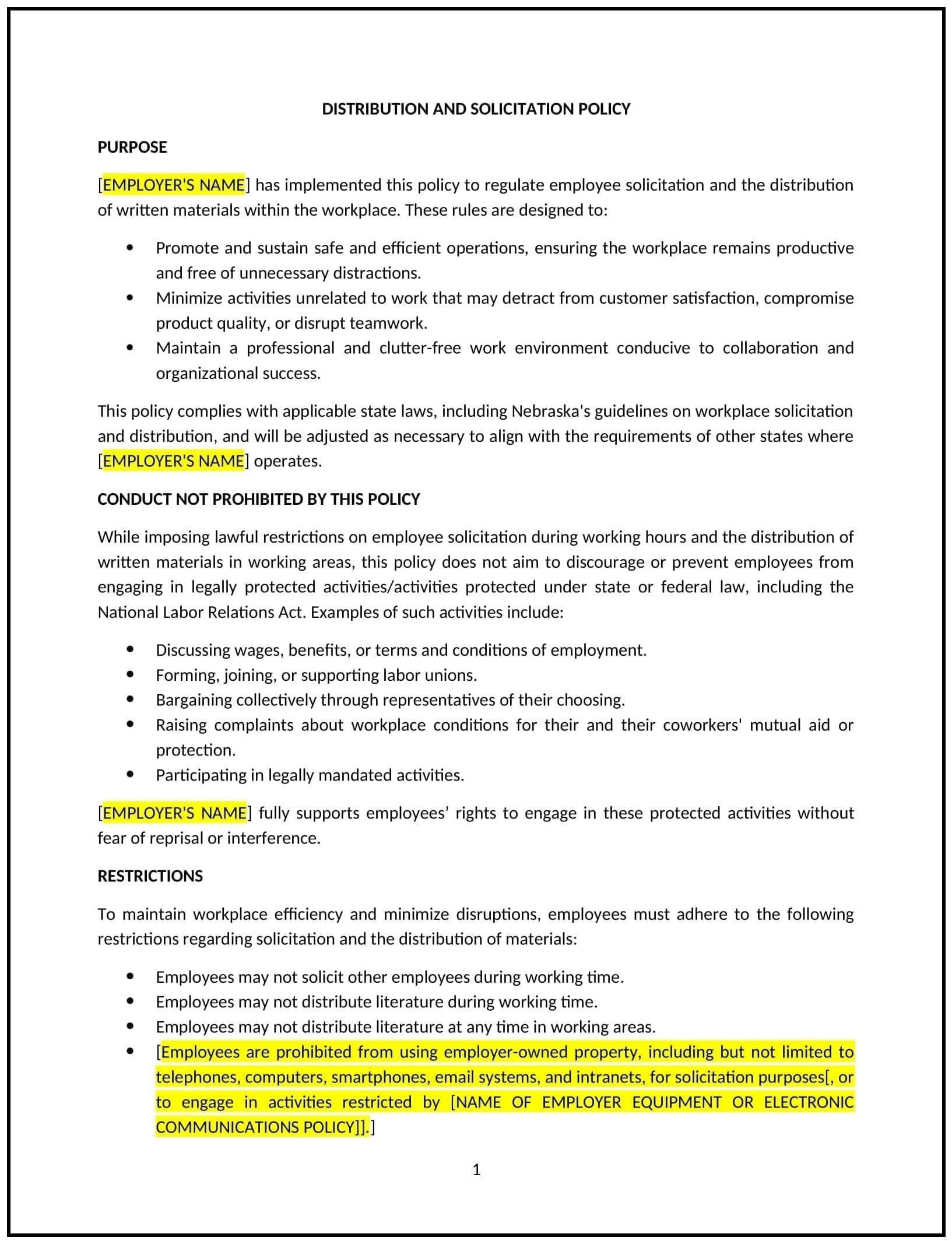Distribution and solicitation policy (Nebraska): Free template
Got contracts to review? While you're here for policies, let Cobrief make contract review effortless—start your free review now.

Customize this template for free
Distribution and solicitation policy (Nebraska)
A distribution and solicitation policy helps Nebraska businesses establish clear guidelines regarding the distribution of materials and solicitation activities on business premises. This policy defines what types of materials or services can be distributed or solicited, the methods by which solicitation can occur, and the areas within the premises where such activities are allowed. It is designed to protect the company’s operations, maintain a productive work environment, and ensure that distribution and solicitation are conducted in a fair and orderly manner.
By adopting this policy, businesses in Nebraska can create a clear, respectful framework for managing distribution and solicitation activities, while minimizing distractions and maintaining a professional environment.
How to use this distribution and solicitation policy (Nebraska)
- Define distribution and solicitation: Clearly define what constitutes distribution (e.g., handing out literature, promotional materials) and solicitation (e.g., requests for donations, selling goods or services) within the business premises.
- Set guidelines for acceptable materials: Specify what types of materials or services can be distributed or solicited, ensuring that all activities align with the business’s values, objectives, and community standards.
- Designate authorized areas: Define where distribution and solicitation activities are permitted, whether in designated areas such as common spaces or outside the building, and restrict solicitation in working areas to prevent disruptions.
- Establish approval processes: Outline the process for obtaining permission to distribute materials or solicit, including who must be contacted to request approval and any required documentation (e.g., type of material, purpose, duration).
- Regulate the time and manner of solicitation: Specify when and how solicitation can occur (e.g., only during certain hours or on specific days) to avoid interference with business operations and employees’ work activities.
- Address prohibited solicitation: Identify any types of solicitation or materials that are prohibited, such as those that are discriminatory, illegal, or disruptive to the workplace.
- Outline employee participation: Clarify whether employees are permitted to participate in solicitation or distribution activities, and if so, under what conditions and during what timeframes.
- Address enforcement: Specify how violations of the policy will be handled, including possible disciplinary action or removal of unauthorized materials or individuals.
- Review and update: Periodically review and update the policy to reflect any changes in laws, company operations, or community needs.
Benefits of using this distribution and solicitation policy (Nebraska)
This policy provides several benefits for Nebraska businesses:
- Minimizes disruptions: By controlling when and where solicitation activities can take place, businesses can prevent disruptions to normal work activities and maintain productivity.
- Protects company reputation: Ensuring that only appropriate materials or services are distributed helps safeguard the business’s reputation and prevents association with controversial or undesirable causes.
- Promotes fairness and transparency: The policy provides clear guidelines for all employees and visitors, promoting a consistent, fair approach to solicitation and distribution.
- Enhances the work environment: A well-structured policy helps create a peaceful, professional work environment by minimizing unnecessary distractions and ensuring that employees are not overwhelmed by unwanted solicitations.
- Reduces legal risks: A clear distribution and solicitation policy can reduce the risk of legal issues related to discrimination, harassment, or the mishandling of materials on business premises.
Tips for using this distribution and solicitation policy (Nebraska)
- Communicate the policy clearly: Ensure that all employees are aware of the policy and understand the guidelines for distributing materials or soliciting on business premises.
- Provide training: Offer training on the policy to help employees understand acceptable and unacceptable practices for distributing materials and soliciting during work hours.
- Enforce consistently: Apply the policy consistently across all employees and external visitors to maintain fairness and avoid confusion.
- Monitor activities: Regularly monitor distribution and solicitation activities to ensure they are in line with the policy and do not disrupt business operations.
- Be flexible where appropriate: While the policy should be clear about rules, allow for flexibility in exceptional cases, such as charitable or community-related events that align with company values.